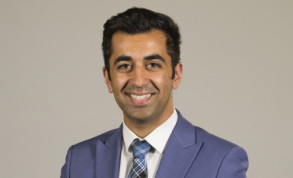Little progress despite improved pay offer
 A meeting on 12 October between the unions and Scottish health secretary Humza Yousaf and deputy first minister John Swinney, where the new offer was made, failed to produce an agreement.
A meeting on 12 October between the unions and Scottish health secretary Humza Yousaf and deputy first minister John Swinney, where the new offer was made, failed to produce an agreement.
However, both sides will maintain negotiations with the aim of reaching a deal. Health unions will continue to ballot members on industrial action.
Royal College of Nursing Scotland director Colin Poolman said: ‘It shouldn’t take the very real prospect of strike action for the Scottish government to return to the negotiating table.
‘For too long the Scottish government has expected nursing staff to do more for less. Our members and our NHS are at breaking point. Fair pay is essential for ensuring safe patient care, for retaining our experienced nursing staff and for recruiting into our profession.’
Before the meeting, Mr Yousaf (pictured) said: ‘We do have a meeting set up with the unions. I will present a significantly improved offer and I hope that meets the expectation. If not, we will get back round the table until we resolve this.’
In June, the government offered a 5% rise for agenda for change staff, but union members rejected this in consultative ballots. The unions are now moving to formalise their members' backing of industrial action.
Unison’s vote ends on 31 October, while Unite opened a ballot on industrial action involving thousands of NHS Scotland workers, last week. Unite is focusing on particular staff groups or health boards. All the union’s members in the Scottish Ambulance Service will be included in the ballot, for example, as well as radiographers who work for NHS Greater Glasgow and Clyde, except those working directly in cancer care. The union said the latter measure would protect cancer services in the event of industrial action.
Health unions throughout the UK are holding – or are planning to hold – ballots on industrial action over pay. AFC staff in England and Wales were awarded an increase of at least £1,400 or 4%. In Northern Ireland there has not been a formal pay offer as the ruling executive has not been formed.
The Royal College of Nursing has asked members in all four nations to vote ‘yes’ to strike action. It has called for a rise of 5% more than inflation, which it said would counterbalance a decade of real terms pay cuts and the cost of living crisis.
Members of the GMB union in six ambulance services – London, the East of England, North East, North West, Yorkshire, and West and East Midlands – are also being asked to vote on industrial action over the pay award.
GMB organiser Lola McEvoy said: ‘Dedicated ambulance workers are leaving trusts in droves, because the workload pressure is too much and the pay is too poor.
‘Those left behind are fighting to protect themselves, their colleagues and the future of the NHS. They do not take industrial action lightly and it's always a last resort – but things can’t go on like this; something has to give.’
Related content
The value masterclass shares examples of organisations and systems that have pursued a value-driven approach and the results they have achieved.
This webinar series offers colleagues of ICS organisations the opportunity to discuss common priorities, challenges, and successes within their field.